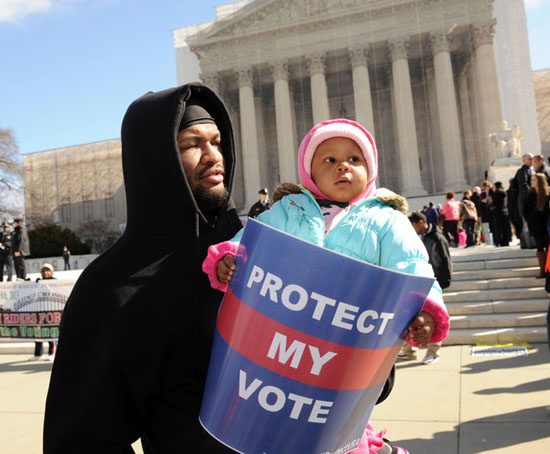
By Richard Wolf and Brad Heath | USA TODAY
A divided Supreme Court effectively killed a key section of the landmark Voting Rights Act on Tuesday, declaring that “our country has changed,” and that the law cannot be enforced unless Congress updates it to take account of a half-century of civil rights advances.
The court’s 5-4 ruling in the case from Alabama frees – at least for the moment — states and municipalities with a history of racial discrimination from having to clear changes in voting procedures with the federal government. That restriction, part of the Voting Rights Act of 1965, has applied to nine states and parts of six others, mostly in the South.
Chief Justice John Roberts wrote the 5-4 decision in Shelby County v. Holder for the court’s conservative majority. The four more liberal justices dissented.
*******
Statement by Clint Bolick, Goldwater Institute:
The U.S. Supreme Court’s decision today to strike down section 5 of the Voting Rights Act is a cause for national celebration.
What was enacted as an emergency measure in response to widespread resistance to black voting rights has long outlasted the emergency. Section 5 imposes heavy burdens on states that do not deserve them. By keeping some states in a perpetual penalty box and forcing them to seek Justice Department approval for the most basic government decisions, section 5 violates principles of federalism. Both the Constitution and other provisions of the Voting Rights Act will continue to protect essential voting rights. The Supreme Court has helped restore the proper balance between the federal protection of civil rights and state autonomy.
In particular, the decision is a victory for Arizonans. Arizona never should have been subjected to section 5 in the first place. It was added in a 1975 expansion that added language minorities to the section 5 protection. The case for sweeping Arizona within section 5 was weak nearly 40 years ago, and it is nonexistent today.
Moreover, section 5 contributes to the racial balkanization of American politics. Voters are packed into districts based on race or ethnicity. That prevents political parties from having to compete for the voters of minority voters and contributes heavily to the political polarization. Voting districts drawn on racial or ethnic lines divide Americans. This decision helps move us toward the day in which racial gerrymandering becomes a relic of the past











